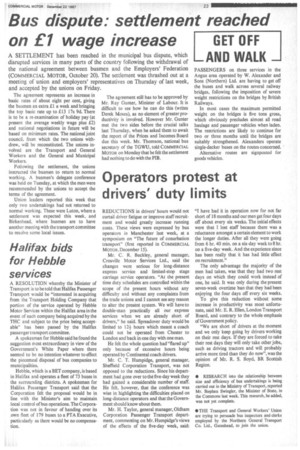Operators protest at drivers' duty limits
Page 25

If you've noticed an error in this article please click here to report it so we can fix it.
REDUCTIONS in drivers' hours would not curtail driver fatigue or improve staff recruitment and would greatly increase running costs. These views were expressed by bus operators in Manchester last week, at a symposium on "The future of conurbation transport" (first reported in COMMERCIAL MOTOR, December 15).
Mr. C. R. Buckley, general manager, Crosville Motor Services Ltd., said the changes were serious for long-distance express service and limited-stop stage carriage service operators. "At the present time duty schedules are controlled within the scope of the present hours without any difficulty and without any complaints from the trade unions and I cannot see any reason to alter the present system. We will have to double-man practically all our express services when we are already short of drivers," he said. Spreadover duty would be limited to 12.4 hours which meant a coach could not be operated from Chester to London and back in one day with one man.
He felt the whole question had "flared up" only because of excessive hours being operated by Continental coach drivers.
Mr. C. T. Humpidge, general manager, Sheffield Corporation Transport, was not opposed to the reductions. Since his department had gone over to the five-day week they had gained a considerable number of staff. He felt, however, that the conference was wise in highlighting the difficulties placed on long-distance operators and that the Government should know about them.
Mr. H. Taylor, general manager, Oldham Corporation Passenger Transport department, commenting on Mr. Humpidge's views of the effects of the five-day week, said: "I have had it in operation now for not far short of 18 months and our men get four days off about every six weeks. The initial effects were that I lost staff because there was a reluctance amongst a certain element to work the longer duties. After all they were going from 6 hr. 40 min. on a six-day week to 8 hr. on a five-day week. And the experience since has been really that it has had little effect on recruitment."
The only advantage the majority of the men had taken, was that they had two rest days on which they could work instead of one, he said. It was only during the present seven-week overtime ban that they had been enjoying the four days off every six weeks.
To give this reduction without some increase in productivity was most unfortunate, said Mr. E. R. Ellen, London Transport Board, and contrary to the whole emphasis of Government policy.
"We are short of drivers at the moment and we only keep going by drivers working on their rest days. If they are forced to take their rest days they will only take other jobs, such as driving tractors and will probably arrive more tired than they do now", was the opinion of Mr. R. S. Boyd, BR Scottish Region.
• RESEARCH into the relationship between size and efficiency of bus undertakings is being carried out in the Ministry of Transport, reported Mr. Stephen Swingler, the Minister of State, in the Commons last week. This research, he added, was not yet complete.
• THE Transport and General Workers' Union are trying to persuade bus inspectors and clerks employed by the Northern General Transport Co. Ltd., Gateshead, to join the union.




















































































